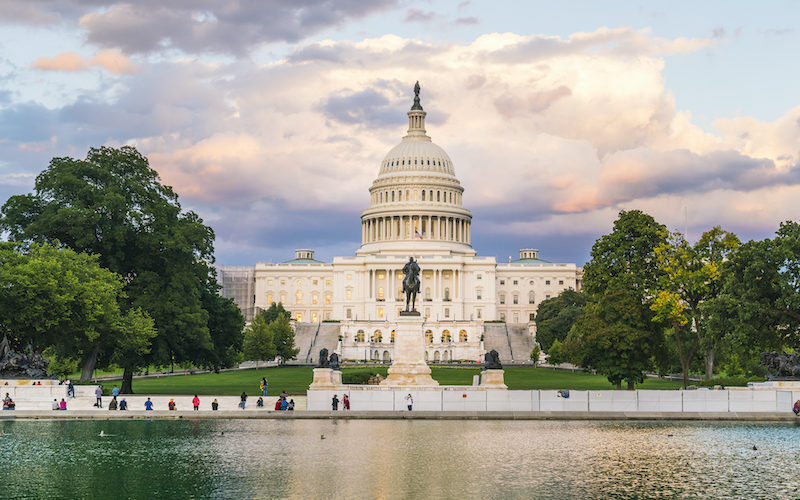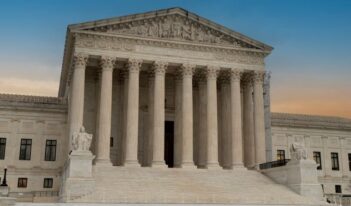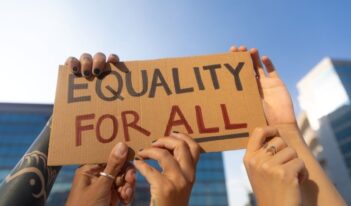
A Supreme Court victory is the beginning, not the end, of the fight against anti-LGBTQ discrimination.
In Bostock v. Clayton County, the U.S. Supreme Court held that anti-LGBTQ discrimination is “because of sex” and thus prohibited by Title VII of the Civil Rights Act of 1964.
Bostock was a major victory, both for LGBTQ rights and for the rule of law. But for those who care about LGBTQ equality, Bostock should not cause us to lose sight of the need to continue to push for legislative reforms, including passage of the federal Equality Act—a proposed law that would further clarify and strengthen protections against anti-LGBTQ discrimination. Although Bostock was an enormously important decision, the Equality Act remains critical to ensuring that equality is a lived reality for the LGBTQ community.
After decades of advocacy in the lower courts, the Supreme Court held on June 25 that existing federal employment discrimination law prohibits discrimination on the basis of sexual orientation and gender identity. Applying straightforward textualist principles, the Court recognized that it is impossible to discriminate on the basis of LGBTQ status without also discriminating “because of sex.”
As the Court recognized, a female employee who is fired for her attraction to another woman would not have been fired if she were a man attracted to women. So too, a transgender woman who is terminated for her feminine appearance would not be terminated if her sex assigned at birth was female. As such, anti-LGBTQ discrimination is “because of sex,” and Title VII thus prohibits anti-LGBTQ discrimination without the need for further legislative amendment.
Practically speaking, Bostock is enormously important, affording clear workplace discrimination protections for the first time to millions of previously unprotected LGBTQ employees. In an era in which LGBTQ employees continue to face high levels of discrimination, harassment, and mistreatment on the job, Bostock will surely mean real differences in the lives of many LGBTQ employees. This decision may be especially important for those segments of the community that face the highest levels of discrimination and harassment, including transgender employees, individuals who face intersectional forms of oppression, and low-income workers.
Bostock is thus a critical step forward toward lived equality—although one that is necessarily incomplete.
Although supporters of LGBTQ equality rightly celebrated the Bostock decision, it is clear that this decision does not mark the end of the struggle for LGBTQ equality. Mere days after Bostock was decided, Senator James Lankford (R-Okla.) blocked the Equality Act from going to a vote in the U.S. Senate. Passed by the U.S. House of Representatives on a bipartisan basis, the Equality Act would codify clear anti-discrimination protections for the LGBTQ community in both employment and in other contexts, including housing, federally-funded programs and activities, and public accommodations. The Act would also make a number of other important clarifications to civil rights law for all protected groups. For example, the Act would ensure protection from associational discrimination—discrimination on the basis of a person’s association with an individual in a protected class—as well as discrimination on the basis of perceived protected class status. In addition, the Act provides that individuals and organizations accused of discrimination may not rely on the federal Religious Freedom Restoration Act to block discrimination claims.
Bostock commanded an enormous amount of attention, both in the mainstream media and on social media, but Senator Lankford’s move to block the Equality Act attracted far less commentary. For example, in the New York Times, the Bostock opinion appeared above the fold on the front page, while the move to block the Equality Act appears to have received no meaningful coverage. To some extent, the lack of coverage may reflect the fact that few expect the current Republican-controlled Senate to pass the Equality Act, so continued obstruction by a Republican Senator seems less newsworthy.
When coupled with the media attention given to Bostock, however, this lack of media coverage of the Equality Act may promote the view that no work remains to be done to secure LGBTQ rights legislatively. Such a view would be both troubling and untrue.
Although many of the additional protections that the Equality Act would afford, such as housing and education protections, already have a strong legal basis under existing federal sex discrimination laws, it will surely take years of litigation to make that fact clear nationwide. After all, Bostock itself—and its protections for employment discrimination—only came after decades of sex discrimination litigation in the lower courts, much of which was unfavorable to LGBTQ employees. Pursuing sex discrimination claims under other laws is likely to be faster and more favorable to the LGBTQ community post-Bostock, given the very strong arguments that Bostock affords plaintiffs—but any litigation will inevitably take significant time. For those who are experiencing discrimination right now—in housing, education, or other domains—it is cold comfort that a court may rule years from now that such discrimination was unlawful.
Even more importantly, because the Equality Act would provide an unambiguous national commitment to LGBTQ equality, it would likely be far more effective at ensuring lived equality for the LGBTQ community than would a judicial decision alone. This is especially true in the context of areas like housing or education that fall outside of Title VII’s scope, where protection against anti-LGBTQ discrimination requires additional clarification in the courts. Although there are surely financial and moral incentives to embrace LGBTQ equality now, for so long as the law remains unsettled, anti-LGBTQ defendants still have incentives to continue testing the bounds of legally permissible discrimination in court.
But even in the domain that Bostock most unambiguously covers—employment actions such as terminations or non-hiring because a person is LGBTQ—the clarity of our national commitment to LGBTQ equality, and our willingness to affirm unambiguously that commitment through legislation, will affect whether employees actually experience lived equality, as opposed to just the ability to bring a lawsuit after experiencing discrimination.
The fundamental objective of anti-discrimination law is to ensure that protected groups do not experience discrimination to begin with. No employee, student, or customer prefers the ability to bring a lawsuit over actual lived equality.
The experiences of other groups who have been the subject of major national legislative commitments to anti-discrimination demonstrate that this fundamental goal of preventing discrimination is difficult and surely will not be fully reached, even with a clear national commitment in the form of legislation.
Thus, for example, despite the enactment of the Civil Rights Act of 1964—hard-fought legislation expressing our national commitment to the eradication of race discrimination—race discrimination remains common today across a host of contexts. Moreover despite the persistence of discrimination, minority plaintiffs face staggeringly high pre-trial dismissal rates when they seek to bring anti-discrimination claims.
In other words, even with the Equality Act, serious obstacles will continue to stand in the way of efforts to ensure that non-discriminatory treatment for the LGBTQ community is a reality. Without the Act, though, those obstacles will be all the more substantial, and lived equality for members of the LGBTQ community will be commensurately less.
A majority of Americans support anti-discrimination protections for the LGBTQ community. This is true in every state, across all age groups and religions, and within both major political parties. It is time for our elected officials to affirm that commitment to LGBTQ equality in the form of national legislation.
This essay is part of a series entitled The Supreme Court’s 2019-2020 Regulatory Term.




